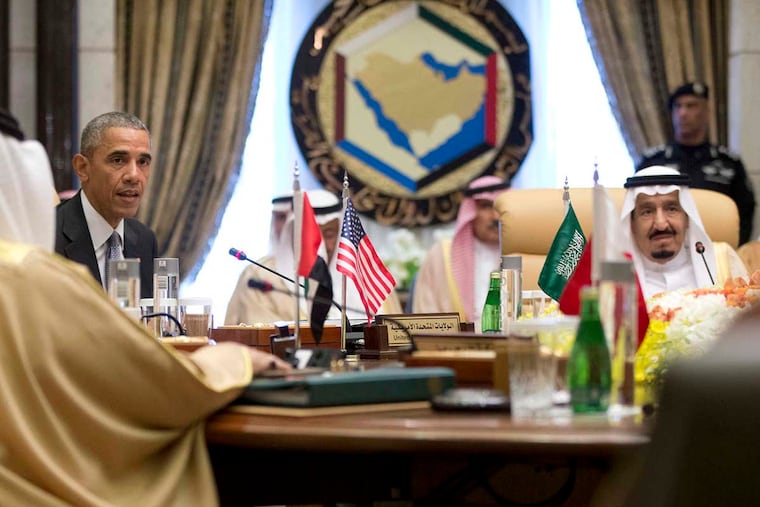Defending the Kingdom
Osama bin Laden was on the run. But not to worry; the Justice Department had his back. Soon after the Sept. 11, 2001, terrorist attacks, as lawyers for families and victims scoured the globe for evidence, they asked for a copy of bin Laden's Interpol arrest warrant, issued at the request of the Justice Department.

Osama bin Laden was on the run. But not to worry; the Justice Department had his back.
Soon after the Sept. 11, 2001, terrorist attacks, as lawyers for families and victims scoured the globe for evidence, they asked for a copy of bin Laden's Interpol arrest warrant, issued at the request of the Justice Department.
Justice did get back to the lawyers, but not with the answer they wanted.
The U.S. government could not release any information without bin Laden's permission because to do so "generally constitutes an unwarranted invasion of privacy," wrote Edgar Smith, a Justice Department official who coordinated information requests with Interpol.
Smith was helpful, though, on how to navigate the bureaucratic thickets.
"You must submit a signed authorization [privacy waiver] from Osama bin Laden consenting to the [department's] release to you of any record it may have pertaining to him," he wrote. "Please note that it is a federal felony to make a false statement on this form."
For more than a decade, 9/11 survivors and insurers that lost billions at Ground Zero have stubbornly pursued a high-risk lawsuit accusing Saudi Arabia of responsibility for the hijackings.
Throughout, they have parried an endless skein of legal counterpunches by the Saudis and their high-priced American lawyers. But some of the highest hurdles for the 9/11 victims were thrown up not by the kingdom, but rather by the U.S. government.
The Bush and Obama administrations have impeded the litigation and harmed the interests of the U.S. plaintiffs, even as the Saudis complained that the legal challenge was damaging ties with the United States.
The U.S. government has its reasons for weighing in against the litigation. Saudi Arabia, though somewhat diminished in stature and economic might now that oil prices have tanked, remains an important ally. As a general principle, the federal government has long frowned on litigation by its own citizens against foreign sovereigns, lest the lawsuits disrupt strategic relationships that bear on national security and economic interests.
But lawyers at the Philadelphia firm Cozen O'Connor, which filed the original lawsuit against the kingdom and has played a leading role in the litigation, say the law creates clear exceptions in cases in which foreign governments or their employees engage in illegal conduct. The core allegation: The Saudi government bankrolled Islamist charities that funded al-Qaeda as it grew from a regional terrorist group in the early 1990s to a global threat. It charges, as well, that Saudi government employees formed a support network in the U.S. for the 9/11 hijackers before the attacks.
"We have faced persistent obstacles in the effort to develop evidence in support of the claims," said Sean Carter, Cozen O'Connor's lead litigator in the case.
For sheer audacity, the Justice Department decision early on to keep secret bin Laden's Interpol arrest warrant deserves special note.
A more recent example of the U.S. government's efforts to frustrate the litigation emerged a few weeks ago. Obama administration officials lobbied senators to vote against legislation clarifying that the 9/11 victims could litigate their claims against Saudi Arabia - and any other foreign sovereign state implicated in terrorism - in U.S. courts.
They brandished a threat by the Saudis, quickly discredited by economists and finance experts, to withdraw $750 billion in assets in the U.S. if the bill became law.
The Senate passed the bill anyway, and it now faces favorable odds in the House as well as a likely presidential veto.
It was not the first time that the U.S. government had helped the Saudis.
In June 2009, as President Obama touched down in Riyadh for a visit with then-King Abdullah, the U.S. solicitor general's office filed an amicus brief urging the Supreme Court not to hear the appeal of a lower-court decision dismissing Saudi Arabia as a defendant.
The filing was the culmination of a ferocious behind-the-scenes battle within the administration that was resolved in favor of the Saudis. Three weeks later, the Supreme Court, taking its cue from the then-solicitor general, Elena Kagan, decided not to take the case.
"It was a gift to the Saudis," said one of the lawyers involved in the case.
And a devastating blow for 9/11 victims and their families.
Terry Strada, whose husband, Tom, died in the north tower of the World Trade Center on 9/11, said that in a meeting after the amicus filing, Deputy Secretary of State James Steinberg and other administration officials explained that they wanted to resolve the matter diplomatically, not in court. Strada pointedly notes that, since then, there has been no diplomatic resolution.
"I was so angry I refused to shake their hands" when the meeting ended, Strada said.
The Obama administration followed up with another amicus brief in 2013, asking that the high court reject an appeal by 9/11 victims of yet another lower-court decision that dismissed dozens of Saudi-linked banks, islamist charities, and terrorism financiers as defendants.
Then, in 2014, Justice Department lawyers blocked efforts by the 9/11 victims and insurers to seize $6 million from an al-Qaeda investment account in Chicago, using tactics that an appellate panel called "gamesmanship."
How so? The panel noted that the government had kept secret the discovery of an al-Qaeda investment account until after the legal deadline for 9/11 victims to file their claim had passed.
The 9/11 victims and their lawyers say the U.S. government's actions have only made their task harder. It's a dispute that sooner or later will be sorted out by Congress and the courts.
215-854-5957
@cmondics